Ranking NBA Teams by All-Time Best Teammate Trios
The current NBA seems to be dominated by superstar pairs. The West is run by LeBron James and Anthony Davis, with the duos of Kawhi Leonard and Paul George, Nikola Jokic and Jamal Murray, Russell Westbrook and James Harden, Donovan Mitchell and Rudy Gobert, and Luka Doncic and Kristaps Porzingis hot on their tail. The East is largely the same: there's Giannis Antetokounmpo and Khris Middleton in Milwaukee, Ben Simmons and Joel Embiid in Philadelphia, Kyrie Irving and Kevin Durant awaiting their opportunity in Brooklyn, and some other more balanced rosters.
But at one point, even recently, trios largely dominated the top of the NBA. So, we've decided to look back through history and rank every NBA team by their best trio that ever stepped out on the floor. The only requirement for each team's trio is that the three players were together for at least three seasons.
This list is a good blend of objectivity and subjectivity.
It's objective because I used a certain stat to help me come up with many of the trios. Win shares was especially useful here, as a high count of win shares from multiple players on the same team likely indicates that the team had a successful season, and that those players were the driving forces behind it. Thus, the all-time greatest trios for each team were born from this statistic, which isn't perfect, but which certainly is a useful tool to use. I also looked at team success during the span of a certain trio's time together to determine the rankings. In addition, trios that stayed together for longer were rewarded for that consistency.
But then, there's a degree of subjectivity. For as you'll see, it doesn't just go in order of total win shares, or win shares per season played together. That would be no fun. The trios also weren't determined solely by the statistics, as I felt that a star presence that played with a team for a shorter time may be more worthy of another good player who just wasn't as much of a fan favorite. I felt that a trio's cultural impact played a large role, though sometimes the stats overruled my gut feeling in that capacity. Take the trio I chose for the Bulls, for example, as compared to the trio that literally everyone else would probably consider their most recognizable Big 3.
You'll probably find that you disagree with some of the trios I selected for a given team, especially with great teams like the Celtics and Lakers providing so many viable options. But that's the fun of it!
Let me us know your thoughts on Twitter, @RDCSports!
All stats retrieved from Basketball Reference and Stathead.
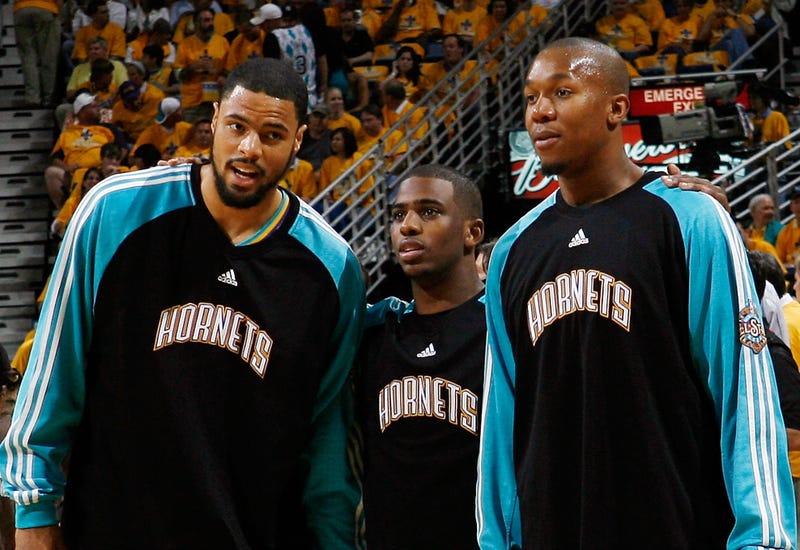
Nos. 30-26
30. Charlotte Hornets/Bobcats: Alonzo Mourning, Larry Johnson, Muggsy Bogues (1992-1995)
Total win shares (three seasons): 66.8
Win shares per season: 22.27
Though the best Hornets team may have been the early 2000s roster led by Paul Silas, the most exciting trio of players comes down to the early 90s squad featuring Hall of Fame center Alonzo Mourning. Dell Curry's sharpshooting was another formidable factor on this team, though they ultimately made the playoffs in two out of the three years and never made it past the semifinals.
29. New Orleans Pelicans/Hornets: Chris Paul, David West, Tyson Chandler (2006-2009)
Total win shares (three seasons): 87.5
Win shares per season: 29.17
Chris Paul is ranked fourth all-time in win shares per 48 minutes, behind just Michael Jordan, David Robinson and Wilt Chamberlain. Throughout his whole career, he has been largely responsible for carrying the load of his team's success, be it scoring, facilitating the offense or shutting down the opposition on the perimeter. His play allowed the Hornets to go a franchise-best 56-26 in the 2007-08 season. It may not be too long before a new trio takes this spot, though, as Zion Williamson, Brandon Ingram, Jrue Holiday and Lonzo Ball are all looking to make the Pelicans a terrifying team for years to come.
28. Brooklyn/New Jersey Nets: Vince Carter, Jason Kidd, Richard Jefferson (2004-2008)
Total win shares (four seasons): 80.2
Win shares per season: 20.05
Though the Nets of the early 2000s had better team success, as Jason Kidd led a group of very good players including Richard Jefferson, Kerry Kittles and Kenyon Martin to two consecutive NBA Finals, the team's best star trio came immediately after those three consecutive first-place finishes from 2001 to 2003. The first three seasons that this trio played together were all playoff campaigns, while the fourth was one to be forgotten (34-48).
27. Minnesota Timberwolves: Kevin Garnett, Wally Szczerbiak, Terrell Brandon (1999-2002)
Total win shares (three seasons): 79.3
Win shares per season: 26.43
This was KG's team, no doubt about it. Still, both the sharp-shooting Szczerbiak and the all-around floor general Brandon contributed over 20 win shares apiece in the above three-year span, all of which were years in which Minnesota finished with 47 or more wins and made it to the postseason. The T-Wolves' best trio ever may have been Garnett, Latrell Sprewell and Sam Cassell in the 2003-04 season, but that was one of just two years this trio was together. They didn't make the playoffs in the other one, 2004-05.
26. Indiana Pacers: Reggie Miller, Detlef Schrempf, Rik Smits (1988-1993)
Total win shares (five seasons): 113.2
Win shares per season: 22.64
Had the peaks of Miller, Jalen Rose and Jermaine O'Neal all crossed paths at the same time, and for longer than two seasons, they'd almost certainly have this spot. But the best Pacers teams, including the 1999-00 Finals team and the 56-26 2013-14 roster, relied on a lot of balance despite the presence of stars like Miller and Paul George. Thus, it's hard to find a better trio than this memorable group that became a playoff regular after starting 28-54 in the 1988-89 season.
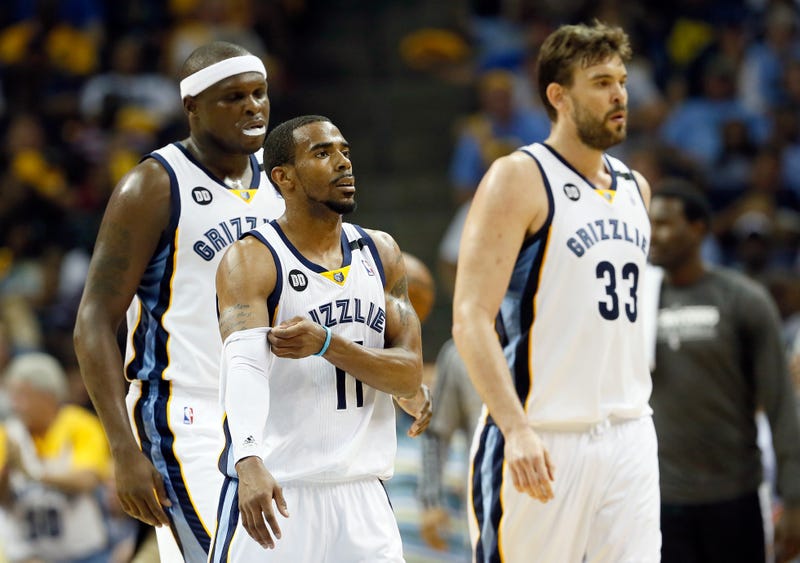
Nos. 25-21
25. Sacramento Kings: Peja Stojakovic, Doug Christie, Chris Webber (2000-2005)
Total win shares (five seasons): 114.8
Win shares per season: 22.96
Though this trio never made the NBA Finals, there was a whole lot of team success: a .683 winning percentage and five playoff appearances across a five-year span meant that this squad could go toe-to-toe with the Kobe-and-Shaq-led Lakers. Mike Bibby and Vlade Divac helped, too, but didn't play with the core of the team long enough at the peak to earn this spot.
24. Toronto Raptors: Kyle Lowry, DeMar DeRozan, Jonas Valanciunas (2012-2018)
Total win shares (six seasons): 143.5
Win shares per season: 23.92
Though Kawhi Leonard took the Raptors above and beyond to their first NBA Finals victory after DeRozan and Valanciunas were out of town, this trio took the Raptors from fifth to first and brought Dwayne Casey a ton of regular season success. Though the playoffs ultimately weren't too kind -- they made five straight postseasons from 2013-2014 to 2017-18, but only made it to the conference finals once -- Toronto asserted themselves as the best team in the Atlantic Division year after year thanks to the consistent play of these three stars.
23. Orlando Magic: Shaquille O'Neal, Penny Hardaway, Nick Anderson (1993-1996)
Total win shares (three seasons): 93.4
Win shares per season: 31.13
The Magic were utterly dominant for this brief span in the 90s, just four years after the franchise's birth in the 1989-90 season. They had 50, 57 and 60 wins in the three seasons of playing together, figures that weren't matched for the next 20 years until Dwight Howard came along and rejuvenated the franchise. The peak may have come in 1994-95, when young Shaq was the runner-up for the league MVP and the Magic made the Finals.
22. Memphis Grizzlies: Marc Gasol, Mike Conley, Zach Randolph (2009-2017)
Total win shares (eight seasons): 171.5
Win shares per season: 21.44
The explosive and athletic Ja Morant-led Grizzlies of 2020 are a nice departure from the old, slow, methodical ways of the 2010s Grizzlies. But that's not to say that those Memphis teams were bad. In fact, they were excellent... in the regular season. Gasol, Conley and Z-Bo led the Grizzlies to seven straight playoff appearances from 2010-11 to 2016-17, but only made it to the conference finals once.
21. Atlanta/St. Louis Hawks: Bob Pettit, Cliff Hagan, Lenny Wilkens (1960-1965)
Total win shares (five seasons): 121.4
Win shares per season: 24.28
There were other trios I had to consider, including those of Josh Smith, Joe Johnson and Al Horford, and Dominique Wilkins, Doc Rivers and Tree Rollins, but ultimately the earliest team was the one that boasted the best threesome. Pettit and Hagan were the main two guys, winning a championship in 1958 before Wilkens debuted in 1960. Though Wilkens' peak may have come later on, the trio made it to the Finals in their first year together and made three other playoff appearances.
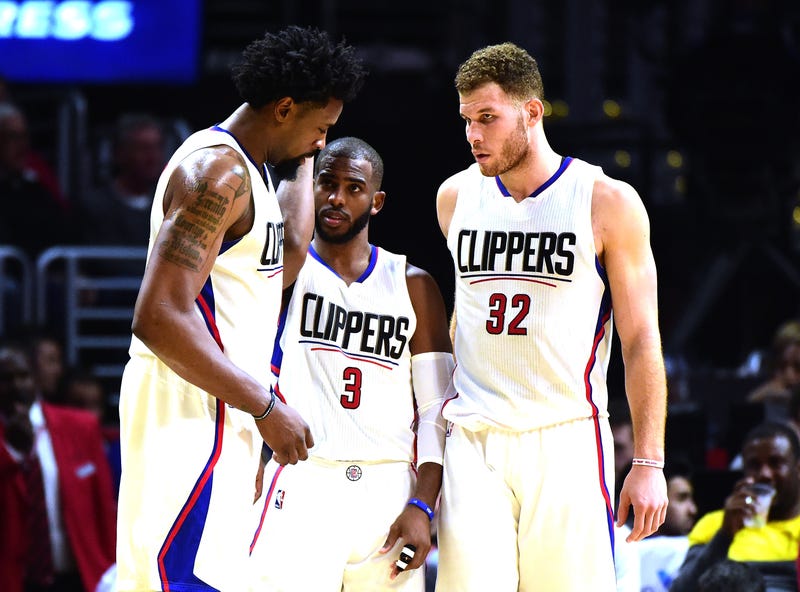
Nos. 20-16
20. Dallas Mavericks: Dirk Nowitzki, Michael Finley, Steve Nash (1998-2004)
Total win shares (six seasons): 150
Win shares per season: 25
The championship-era Mavericks had a lot of strong pieces, but no trio of players was as much of a core to the team as were Nowitzki, Finley and Nash earlier in the millennium. Had they all been at their peak -- Dirk and Nash would have to have been a little older -- this trio probably would have picked up at least one Finals ring.
19. Denver Nuggets: Alex English, Dan Issel, Kiki Vandeweghe (1980-1984)
Total win shares (four seasons): 101.2
Win shares per season: 25.3
Fat Lever's strong play in the late 80s came a little bit after this trio's time together, but I would be remiss if I didn't mention Lever and his importance to Denver's success. However, it's this trio -- two of whom are Hall of Famers -- that earns the spot for Denver on this list. With Nikola Jokic and Jamal Murray turning the Nuggets into a perennial playoff contender, you have to wonder if a third piece can form a new dominant trio in the current NBA.
18. Portland Trail Blazers: Clyde Drexler, Terry Porter, Jerome Kersey (1985-1995)
Total win shares (10 seasons): 234.8
Win shares per season: 23.48
Though Portland made two NBA Finals, they couldn't capture the ring in either opportunity. However, Drexler's constant scoring prowess was supported well by Porter and Kersey and allowed the Blazers to reign among the top of the West more often than not throughout the decade they played together.
17. Los Angeles Clippers: Chris Paul, Blake Griffin, DeAndre Jordan (2011-2017)
Total win shares (six seasons): 189.8
Win shares per season: 31.63
Perennially dominant in the regular season. Perennially disappointing in the playoffs. That was the tale of the 2010s Clippers, who, despite five consecutive 50-win seasons, never made it past the Western Conference Semifinals. However, the Lob City trio listed above is definitely worthy of a spot on this list.
16. Phoenix Suns: Steve Nash, Amare Stoudemire, Shawn Marion (2004-2008)
Total win shares (four seasons): 132.3
Win shares per season: 33.08
This trio probably should have performed better in the playoffs given their dominant regular season success -- they picked up 62, 54, 61 and 55 wins in their four seasons together -- but ultimately never made a trip to the Finals. Still, Nash is a Hall of Famer, Marion is a near lock and Stat played like a Hall of Famer during this span.
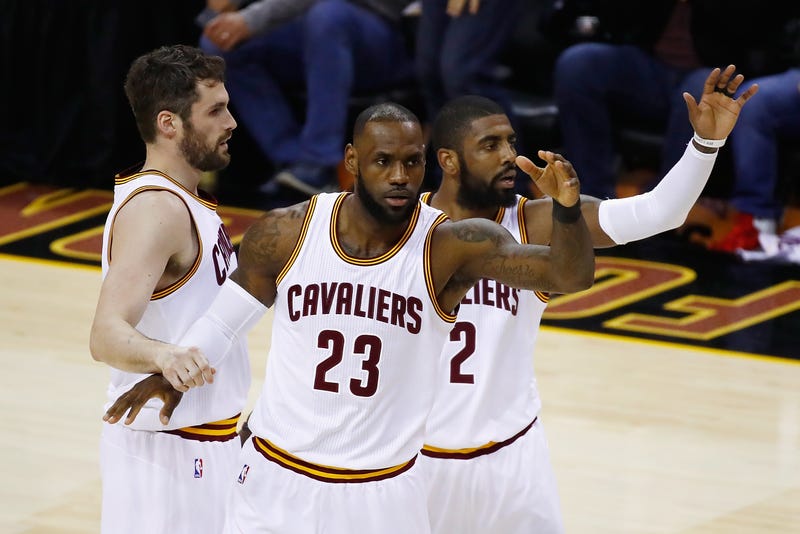
Nos. 15-11
15. Cleveland Cavaliers: LeBron James, Kyrie Irving, Kevin Love (2014-2017)
Total win shares (three seasons): 84.8
Win shares per season: 28.27
I wanted to go with Mark Price, Brad Daugherty and Larry Nance, here, given their longevity as a trio (seven seasons) and their productivity (23.39 win shares per season). However, my eyes automatically get drawn to the prize, and the Cavs' only Finals victory in 2015-16 was made possible thanks to this trio playing some top-notch basketball. All three are legitimate stars, and they could have done a lot more damage together had chemistry issues and a desire for bigger markets not interrupted their stretch.
14. Houston Rockets: Hakeem Olajuwon, Otis Thorpe, Kenny Smith (1990-1995)
Total win shares (five seasons): 131
Win shares per season: 26.2
If only the trio of Hakeem Olajuwon, Charles Barkley and Clyde Drexler had played together during the three players' peaks instead of toward the end of their careers. But they didn't, and it was a trio that came just before them that earns the well-deserved title here. Olajuwon was the leader in win shares in every year but the first (when Thorpe had 10.4), but all three contributed in a big way and helped earn head coach Rudy Tomjanovich two Finals rings toward the end of the stretch.
13. Oklahoma City Thunder: Kevin Durant, Russell Westbrook, Serge Ibaka (2009-2016)
Total win shares (seven seasons): 210.4
Win shares per season: 30.06
There was no sports crowd like an OKC home crowd during the playoffs. The shocking blue that rippled throughout the Chesapeake Energy Arena is all thanks to the Big 3 of the Thunder, who led the franchise to five first-place finishes in seven seasons, and another 50-32 season which was good for only fourth place in an absolutely stacked Northwest Division. Seattle's Gary Payton, Shawn Kemp and Detlef Schrempf were close, but didn't quite bring the same star power that KD, Russ and the shot-blocking machine Ibaka brought to the table.
12. Washington Wizards/Bullets: Wes Unseld, Elvin Hayes, Phil Chenier (1972-1980)
Total win shares (eight seasons): 177.2
Win shares per season: 22.15
There was only one losing season in this span, and it came at the very end of the stretch (39-43 in 1979-80 season). But before that, the Bullets were regulars at the top of the standings, capturing the franchise's lone Finals ring in 1977-78 and appearing in two others. Unseld and Hayes were the main draws, but Chenier was a three-time All-Star within this span and made the 1974-75 All-NBA team.
11. Detroit Pistons: Isiah Thomas, Joe Dumars, Bill Laimbeer (1985-1994)
Total win shares (nine seasons): 177.7
Win shares per season: 19.74
Dennis Rodman could have slipped into this trio and replaced any of the above guys easily, and it would still be a really strong group. However, for the sake of getting the longest possible span of seasons, I went with the above three, who ushered in a new era of basketball not only into Detroit, but into the league as a whole. Their cultural impact -- the "Bad Boys" era -- is what puts them above some groups that may be considered more statistically productive. But it's hard to deny this group's talent, as they captured two NBA Finals in the middle of the stretch and was a regularly winning team until the abysmal 1993-1994 campaign.
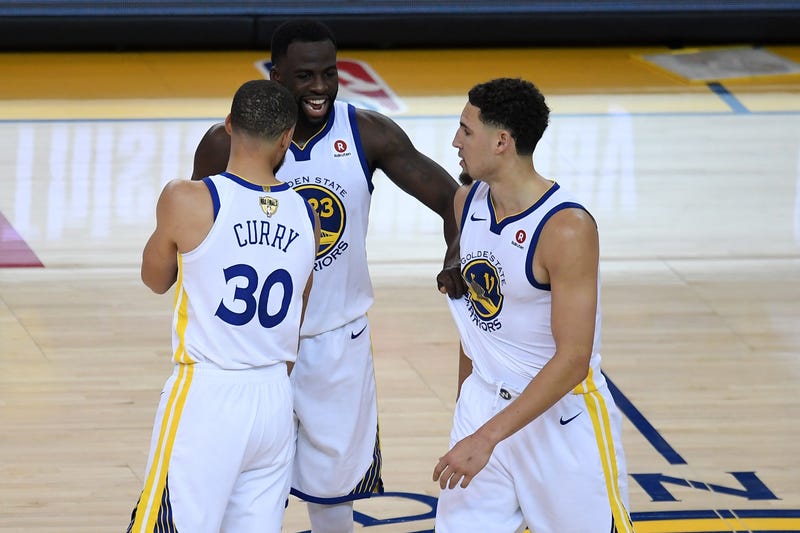
Nos. 10-6
10. Philadelphia 76ers: Moses Malone, Julius Erving, Mo Cheeks (1982-1987)
Total win shares (five seasons): 127.6
Win shares per season: 25.52
Charles Barkley joined the party just a bit too late for his inclusion in a Sixers' Big 3, but Philly is able to boast three Hall of Famers anyway. You've got post domination in Moses Malone, you've got athleticism and veteran leadership in Dr. J, and you've got lockdown perimeter defense and great ball facilitation in Mo Cheeks. What does that equal? The team's most recent Finals victory and the most exciting era in Sixers basketball history. Current fans are desperately hoping that Joel Embiid, Ben Simmons and some undiscovered third -- I don't think it will be Tobias Harris -- can become a new candidate for this spot.
9. Utah Jazz: Karl Malone, John Stockton, Jeff Hornacek (1993-2000)
Total win shares (seven seasons): 234.7
Win shares per season: 33.53
It's unfortunate that the Jazz's peak years came at the same time as the Last Dance-era Bulls, because they almost surely would have won in a different time period. To be fair, this group was more of a Big 2 and a good third piece, but Hornacek's 55 win shares were still much higher than teammates like Bryon Russell's 32 and the rest of the Jazz's role players. Malone led the way with 100.3, while Stockton was not far behind at 79.4.
8. Milwaukee Bucks: Oscar Robertson, Kareem Abdul-Jabbar, Bob Dandridge (1970-1974)
Total win shares (four seasons): 158.1
Win shares per season: 39.53
Four first-place finishes, two Finals appearances and one Finals victory represent this trio's reign in Milwaukee, and it's slightly underwhelming that they didn't achieve more in this brief span together. After all, Kareem and Big O are both arguably top 10 players in the history of the game, while Dandridge has a legitimate case for the NBA Hall of Fame given his career stat line of 18.5 points, 6.8 rebounds and 3.4 assists per game. However, Robertson was far past his prime in this stretch, and there's almost no way this wouldn't be a top-five group if you replaced this Robertson with the Big O of the 60s.
7. New York Knicks: Walt Frazier, Willis Reed, Dave DeBusschere (1968-1974)
Total win shares (six seasons): 164.5
Win shares per season: 27.42
Patrick Ewing, Charles Oakley and John Starks provided the Knicks with a formidable squad throughout the whole 1990s decade. But what they couldn't achieve was an NBA Finals ring, which the above trio was able to capture twice in a six-year span. Sure, the presences of Dick Barnett, Bill Bradley and Earl Monroe (later on) helped with those strong displays, but the core three of Frazier (81.7 WS), Reed (47.9) and DeBusschere (34.9) were the primary guys to thank.
6. Golden State Warriors: Stephen Curry, Klay Thompson, Draymond Green (2012-Present)
Total win shares (eight seasons): 179.2
Win shares per season: 22.4
You can bump up that WS per season average, considering 2019-20 was a complete lost cause. But before this year, this trio absolutely dominated the NBA. Why are they not in the top five? It's less of a knock on their talent as it is as proof of just how talented the remaining five groups are, but it also doesn't help that Kevin Durant was the team's leader in win shares in both 2017-18 and 2018-19 and helped them win two of their three rings. Still, this trio won it all without Durant, and will look to do it again with a potential big-name acquisition in the near future.
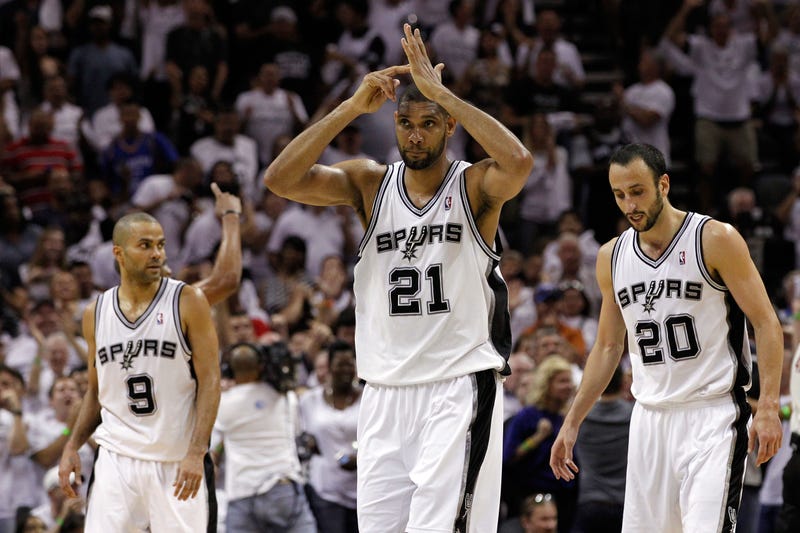
Nos. 5-1
5. Miami Heat: LeBron James, Dwyane Wade, Chris Bosh (2010-2014)
Total win shares (four seasons): 135.1
Win shares per season: 33.78
Though they couldn't achieve the three-peat, they were able to record a Finals appearance four-peat in a four-year span, which sums up just how dangerous this trio was. All three guys scored over 17 points and five rebounds per game during this span, showing that though LeBron was the biggest piece, Wade and Bosh were All-Star level players all throughout. With the Heat's current group of talent, including Jimmy Butler, Bam Adebayo and several rookies (Kendrick Nunn, Duncan Robinson, Tyler Herro), you have to wonder if this team will be able to replicate the success of this Big 3 -- even just one year of the Big 3's success -- at some point soon.
4. San Antonio Spurs: Tim Duncan, Tony Parker, Manu Ginobili (2002-2016)
Total win shares (14 seasons): 344.2
Win shares per season: 24.59
If we were talking about the greatest teammate duos -- which might be a fun separate list -- then it would be hard not to consider Tim Duncan and David Robinson for another top five spot. But while Robinson was one of the greatest NBA players of all time, it's impossible not to go with Duncan, Parker and Ginobili to represent the Spurs on this list. They won the Finals in their first season together, picking up three more rings along the way, and had their worst season in 2009-10, finishing at 50-32. The Spurs are the only other team on this list, outside of our No. 1 spot, with all three players achieving 100 win shares.
3. Chicago Bulls: Michael Jordan, Scottie Pippen, Horace Grant (1987-1994)
Total win shares (seven seasons): 233.3
Win shares per season: 33.33
How, after watching "The Last Dance," do I not go with Jordan, Pippen and Rodman? Culturally, they may have the biggest impact of a "Big 3" of all time. But statistically, Tony Kukoc actually had more win shares than Rodman during the Bulls' second three-peat. And let's not forget about just how good Grant was throughout his career, too. Over the seven-year span above, Grant averaged more points, steals and blocks per game than Rodman did in his three Chicago seasons, though Rodman dominated in the rebounding department. In any case, while Jordan's 115.3 win shares dominated the trio's time together, both Grant (62.4 WS) and Pippen (55.3 WS) played extremely important roles.
2. Los Angeles Lakers: Magic Johnson, Kareem Abdul-Jabbar, James Worthy (1982-1989)
Total win shares (seven seasons): 203.8
Win shares per season: 29.11
The Lakers' worst season in this stretch came in 1983-84, when they finished first with a 54-28 record and lost in the Finals. That was the worst. But with three rings to show for, and with two of those rings coming over perhaps the greatest team of all time in the mid-80s Celtics, this trio has a legitimate argument to be No. 1. Had Abdul-Jabbar been in his 20s, rather than his 30s, who knows what this group's success could have looked like.
1. Boston Celtics: Larry Bird, Robert Parish, Kevin McHale (1980-1992)
Total win shares (12 seasons): 356.6
Win shares per season: 29.72
There were obviously some other trios to consider for Boston. Bob Cousy, Sam Jones and Bill Russell won their fair of share of NBA Finals together; in fact, they won five in six years of action together. Looking a little later, after Cousy retired, you could swap in John Havlicek and come up with another extremely success core. And then, of course, there are Paul Pierce, Ray Allen and Kevin Garnett in the more modern Big 3. But the stretch of 12 seasons throughout which Bird, Parish and McHale dominated the East en route to 12 postseason berths, five Finals appearances and three Finals victories is really, really hard to beat. All three of them posted at least 110 win shares, meaning they largely shared the work, and all had stat lines of at least 17 points and 7.5 rebounds per game over that stretch. Both the length of this trio's tenure and their effectiveness put them firmly at No. 1.
LISTEN NOW on the RADIO.COM App
Follow RADIO.COM Sports
Twitter | Facebook I Instagram